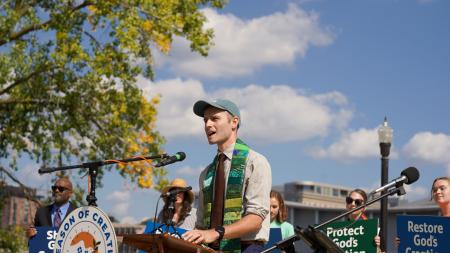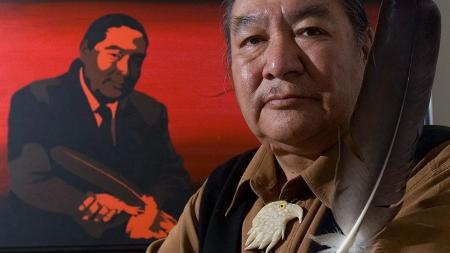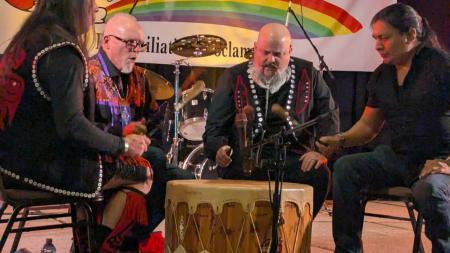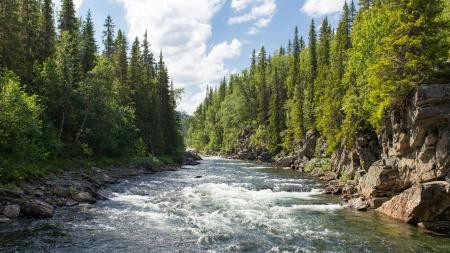Worship the Empire Fears: Oak Flat and the Choice Before Us
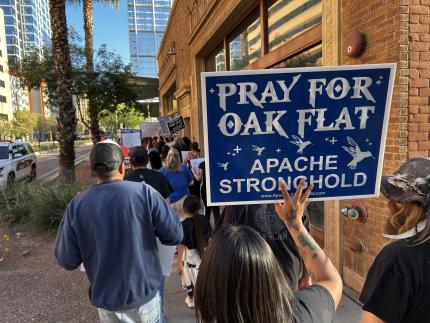
About an hour outside of present-day Phoenix is a site sacred to the San Carlos Apache Tribe: Chi’chil Biłdagoteel—Oak Flat. This small stretch of forest in the Tonto National Forest is home to oaks, water, wildlife, and petroglyphs. But more than that, it is a blessed place. The Apache believe this is where messengers between the people and the Creator—dwell (a Bethel, if you will). For over 1,500 years, this land has been a sacred place. Every year, it hosts coming-of-age ceremonies that welcome girls into womanhood.
Oak Flat is a sanctuary. It is also under threat.
In 2014, language buried in a 2,000-page defense bill allowed for the transfer of Oak Flat to Resolution Copper, a joint venture of international mining giants Rio Tinto and BHP—companies with a long legacy of extraction and exploitation. These corporations are seeking copper beneath the sacred site. If the mine is built, Oak Flat would collapse into a gaping crater—an act the Apache call cultural genocide.
This May, I traveled to Phoenix with leaders from 15 Christian denominations. Together, we joined Apache Stronghold for a prayer vigil the night before a federal court hearing. We welcomed runners who had carried prayers on foot 75 miles from Oak Flat. We marched. We sang. We danced. We held vigil under the desert sky—offering our presence as prayer.
The next morning, a judge issued a temporary injunction, delaying the land transfer. It was a breath of hope. But that breath was nearly choked out just days later, when the U.S. Supreme Court declined to hear Apache Stronghold’s appeal. The suit argued that giving Oak Flat to a mining company violated the religious freedom of the San Carlos Apache Tribe. The Court said nothing in its refusal. But in a rare dissent, Justice Gorsuch, joined by Justice Thomas, wrote: “Before allowing the government to destroy the Apaches’ sacred site, this Court should at least have troubled itself to hear their case.”
The struggle continues. A lower court has granted a 60-day delay to allow for review of a forthcoming environmental impact statement. But the threat still looms.
This is not an isolated story. It is one of thousands—stories of sacred sites turned into sacrifice zones, communities bulldozed by extraction. It’s a story older than America—threaded through Pharaoh in Egypt, Nebuchadnezzar in Babylon, Caesar in Rome. And now, Rio Tinto and BHP. It is the same story in different clothes: extract, consume, discard.
The book of Revelation speaks into that world. John sees through the glimmer of the empire and unveils its violence. In chapter 18, he names Babylon’s cargo: gold, ivory, spices, cattle—and human lives. He sees an economy that turns creation into a commodity. But he also dares to dream: a new heaven, a new earth, a holy city coming down. No more mourning. No more death. No more extraction.
The Apache are dreaming of that city too—and fighting for it.
The struggle to protect Oak Flat is more than policy or protest. It is worship. And not worship as escape, but worship as confrontation. It is an alternative liturgy—a holy refusal of empire’s script. At Oak Flat, prayer is protest. Ceremony is resistance. The Sunrise Dance is a sermon. The land is the sanctuary. And the people are singing a different story.
Walter Brueggemann, who we lost earlier this month, teaches that worship—especially praise—is not just liturgical routine; it is a public, communal declaration of an alternative reality. When we praise God, we are not simply expressing joy or gratitude. We are performing a different allegiance, refusing to accept the world as it is, and bearing witness to the world as God intends it to be. At Oak Flat, that performance is embodied in every drumbeat, every offering, every sacred step of ceremony—a bold proclamation that this land is not for sale. That the sacred cannot be sold. That another way is possible.
And if we’re paying attention, Oak Flat doesn’t just ask for our solidarity. It asks for our transformation.
Because the extractive logic that fuels Rio Tinto also shows up in us—in the ways we treat land as resource, people as tools, relationships as transactions. I’ve never strip-mined a sacred site, but I’ve bulldozed through conversations. I’ve treated the land like it’s mine. I’ve pushed myself past my limits in service of production, forgetting that I am beloved—not just useful.
What the Apache are doing is nothing short of prophetic resilience. Ten years of legal fights, spiritual struggle, ceremony, song. They are holding fast to their land and culture. And we—people of faith—are called to do the same. To see Oak Flat not only as a political issue, but as a sanctuary. A cathedral of creation. A site of spiritual solidarity.
The land still sings. The sacred is still present.
The question is: will we sing with it?
The struggle over Oak Flat is not over. And neither is our call—to choose praise over profit, relationship over resource, communion over consumption.
Oak Flat may only be 6.7 square miles. But it holds the whole story in its soil.
Let’s not let it be turned into a hole in the ground.
Let’s let it be holy ground.
If you want to get involved, let your Members of Congress know that you want to keep Oak Flat in Tonto National Forest and not be given away to a mining company AND to pressure President Trump to meet with Apache Stronghold. Use this advocacy toolkit from the Coalition to Dismantle the Doctrine of Discovery.
Photo provided by the author.

